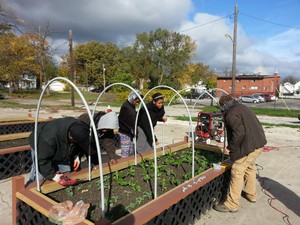Some might say that Presbyterian elder Nathan McCain was destined to become an expert gardener with a wide-ranging impact.
As McCain explains, “My father, who was born in 1901, went through an agricultural training program conducted by George Washington Carver.”
That’s the George Washington Carver, whose research and innovations in agriculture and other sciences gained worldwide fame.
McCain, who grew up with five brothers and sisters, recalls, “We grew everything from A to Z in that vegetable garden and orchard, to feed our family and others.”
Now, that shared knowledge has created a new beginning at the oldest African American church in Maumee Valley Presbytery in northwest Ohio.
The congregation, Grace Presbyterian Church in Toledo, has received a $7,500 New Worshiping Communities grant from the Presbyterian Mission Agency for an initiative designed not only to help grow food for low-income neighbors but also to provide a range of spiritual and educational ministries.
The new worshiping community, called The Gardens of Grace–Holy Harvest Ground, also has received a $15,000 grant through the Toledo Foundation’s ProMedica healthcare Advocacy Fund to feed at-risk families.
Grace Presbyterian’s commitment to feeding at-risk families spans generations. McCain got married at Grace Presbyterian 35 years ago. For much of his time there Grace has run a nutrition program for seniors. But the government agency that helps sponsor it eliminated a number of sites around the city to build a larger, consolidated center. The church now supplies that center with fresh fruits and vegetables—produced by Holy Harvest Ground.
The new worshiping community sprang to life after Grace and other congregations in the presbytery went through the New Beginnings process. Offered by the Presbyterian Mission Agency, New Beginnings is an assessment and discernment process that helps churches make meaningful decisions about their future.
“Our average age is 84,” says McCain. “We all realized that if we didn’t have a new beginning, we’d be gone in a few years.”

The bounty on two acres of gardens at Holy Harvest Ground supports several food pantries, two elementary schools, and helps host cooking classes. —The Gardens of Grace
Through New Beginnings, Grace realized that its passion for nutrition and community outreachwas still there.“We found a way to stay by finding common connections with our neighboring churches that helped us work together for good,” McCain says.
In a session meeting after the New Beginnings process, Grace’s treasurer mentioned the expense of cutting the grass of several adjacent lots that the church owns.
“As we were having that conversation, several of us began to see a vision,” says McCain.
“Instead of just routinely cutting grass, we began to wonder if we could form a new worshiping community around the mission of a community cooperative garden.”
Church leaders got behind the idea, talking with congregation and community members about what this might look like. The discussions spread, with others chiming in about the growing poverty, malnutrition, and generational deficits in the larger community.
“They talked about illiterate and hungry children, the lack of educational guidance, middle-class value formation, and executive skills development for youth,” says McCain.
Eventually Grace decided to partner with an ecumenical group, Toledo Campus Ministry, to engage more college-aged students in nutrition, food literacy, and civic responsibility—to build a new worshiping community of younger adults.
“Helping Grace dig sweet potatoes helped me develop my faith experience, one step at a time,” says engineering student Alex Miller.
Holy Harvest Ground has about two acres of gardens and five raised beds, thanks to a renewed partnership with Collingwood Presbyterian Church, which founded Grace as a mission church in 1919.
With its bountiful harvest, Grace supports several food pantries and two elementary schools. Grace also supplies food that helps Collingwood host a cooking class and a monthly community-wide thanksgiving dinner.

Youth learn executive skills year-round at the Gardens of Grace. Here students build a mini hoop house over raised beds to keep harvest going in the winter. —Holy Harvest Ground
And opportunities to grow Grace’s acreage continue to come. Grace is now working with municipal agencies to turn vacant lots from liabilities into assets through a planned Mustard Seed program. “We’re working on creating a citywide program to reduce the expense of cutting grass with the state, city, and county land banks,” McCain says.
Meanwhile, the multifaceted vision for Holy Harvest Ground is becoming a reality. In late October students who worked in the gardens met with Toledo Campus Ministry for a worshiping community gathering. And last month Holy Harvest Ground gathered for its first shared meal as a worshiping community.
In addition, partners in the ministry are teaching executive skills to youth year-round at the gardens, helping to combat teenage unemployment and to build character. Seventeen at-risk youth tended the gardens this summer.
“One single mom wrote to thank us for helping her daughter become a lady,” says McCain, “for providing her with positive role models.”

